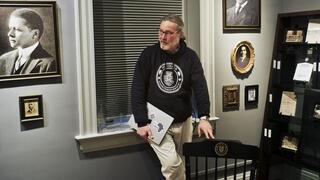To commemorate the 30th anniversary of the Americans with Disabilities Act (ADA), alumni led a special livestream forum featuring two iconic national disability rights figures who were instrumental in the passage of this historic bill.
The program was hosted by the Yale Alumni Association and supported by DiversAbility at Yale and the Yale Office of Diversity and Inclusion. Moderating the event were Janni Lehrer-Stein ’78, an attorney and disability rights advocate who served on the National Council on Disability in the Obama administration, and Benjamin Nadolsky ’18, co-founder and former president of Disability Empowerment for Yale.
They led a robust discussion with Judith E. Heumann and Anthony Coelho, who shared their reflections on the ADA, its impact, and their thoughts on the future of disability policy, rights, and practices in the United States.
Heumann, a lifelong disability rights advocate who served in the Clinton and Obama administrations, the nonprofit sector, and at the World Bank and State Department to promote the mainstreaming of disability rights domestically and abroad, played a prominent role in galvanizing public support to get the ADA passed. Her story was recently featured in the Netflix documentary, Crip Camp.
Coelho, a former six-term U.S. congressman from California who has spent his entire adult life as a champion and voice for people with disabilities, is credited by congressional colleagues as the primary author and sponsor of the ADA.
Significance and Impact of the ADA
Signed into law in 1990 by President George H.W. Bush ’48, the ADA prohibits discrimination and mandates equal access and opportunity for persons with disabilities in all areas of public life, including employment, education, and transportation. In short, the purpose of the ADA is to ensure that people with disabilities have the same rights and opportunities as everyone else.
Noting that there are 68 million people with disabilities in the United States, and at least one billion around the world, Heumann extolled the importance and impact of the ADA but also was mindful of its limitations.
“There are millions of disabled individuals that continue to be discriminated against,” she said. “The stigma of disability is such still in the United States that many people are unwilling to talk about having a disability.”
Coelho indicated that one of the challenges for the ADA is keeping up with the times, particularly with advancements in technology, to ensure equal access. He noted that 98.2% of all websites are inaccessible to people with disabilities, and while encouraged by the Supreme Court’s recent “acknowledgement” that the ADA also covers digital accessibility, he fully expects enforcement by the Justice Department and other legal and regulatory entities would be necessary to ensure compliance.
In stressing the importance and wide-ranging impact of the ADA, Coelho pointed out that many of the technologies and accommodations mandated by or made possible through the act, like closed captioning and wheelchair ramps, benefit not just the disability community.
“So many people besides those with disabilities benefit from what the ADA has done,” he said.
He warned, however, that in light of repeated and ongoing attempts to undermine and dismantle the ADA, including by those within Congress, constant vigilance is required to preserve its existence and efficacy.
“The ADA is not something that we can just ignore and not worry about because it’s going to be there forever – that’s just not true,” Coelho said. “And what we’ve got to do is to keep fighting, keep educating, in order to keep it.”
Heumann said that many more people, with and without disabilities, needed to familiarize themselves with the ADA, the rights and protections that it offers, and understand how to recognize and deal with discrimination, including how to file a complaint and report violations.
“The ADA is a great piece of legislation, but nothing gets done without working on implementation,” she said.
Future of Disability Policy and Rights
Referencing the recent U.S. presidential election, Coelho asserted that anyone contemplating a run for public office – whether it’s mayor of a small town, the Senate, or even the presidency of the United States – should consider what an important voting constituency people with disabilities are.
“We’re larger than most any other group, except for women,” he said, adding that the disability community must leverage its numbers and political influence to secure better opportunity and access for future generations. “It is important for those of us with disabilities to fight for our rights and help make a situation so that younger people who follow have a better life.”
According to Heumann, a major attitudinal shift in American society is also required.
“We have to normalize disability,” she said. “Disability needs to move away from cure and tragedy to equality and rights, and recognizing that we come in every color, in every religion, every sexual orientation.”
With respect to advice for students and young people with disabilities, Coelho stressed the importance of self-acceptance and active participation to lift up themselves and others.
“You’ve got to accept yourself and project out that you’re happy with who you are,” he said. “Believe in yourself and push for the things that are needed for our community.”
In wrapping up the program, Lehrer-Stein emphasized that while the ADA is the law of the land, the extent to which equal rights and opportunity will truly take shape in the U.S. will depend on how closely Americans work together to realize the spirit and intent of this legislation.
“The Americans with Disabilities Act was a step toward recognizing the power and potential of every American, including those with disabilities,” she said. “The message of this very complex time that we find ourselves in now is that we must find that common ground in order to ensure that every one of us can survive and thrive.”



